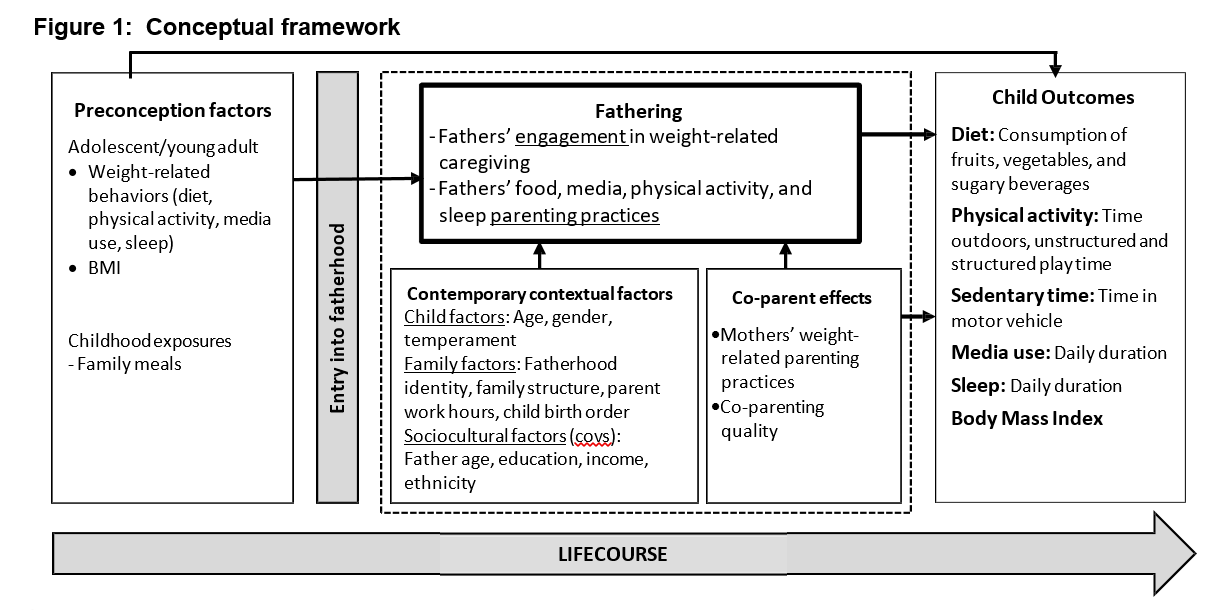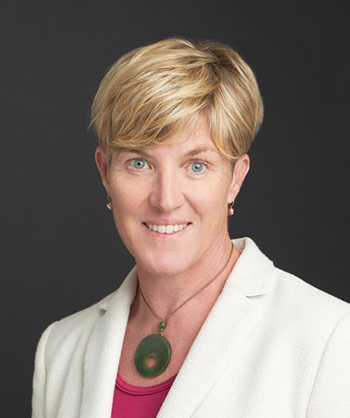Fathers & Families
“Fathers have been largely ignored by research. Times have changed. We need to hear from fathers so we can develop strategies that help families successfully promote their children’s health.” PI Kirsten Davison

Project Summary
Fathers & Families (F&F) is a cohort of over 1200 biological, adoptive, and social fathers, with preschool-aged children (ages 1-6 years), and their co-parents. It is the first large-scale study to provide a comprehensive assessment of the role of fathers in childhood obesity prevention while addressing the limitations of previous research. Fathers’ parenting practices targeted toward their children’s diet, physical activity and sleep behaviors are a focal point of the study.
Research Questions
F&F can address a wide range of research questions about fathering and children’s health including:
- What parenting strategies do fathers use to support healthy diet, physical activity and sleep behaviors in their children? Do fathers and their co-parents use similar parenting strategies?
- Do children’s age, temperament and weight status affect fathers’ food, physical activity and sleep parenting practices? For example, do fathers use different strategies when their child is 2-years-old versus 5-years-old?
- What are the links between fathers' parenting practices and children's diet, physical activity and body mass index (BMI)?
- What are the combined and independent effects of fathers' and co-parents' parenting strategies on children’s health outcomes
F&F also examines contemporary topics such as the role of fathers’ in children’s COVID-19 vaccination and fathers’ engagement in their children’s health care.
Innovation
One of the key innovations of this study is that it involves the largest cohort of fathers in childhood obesity research. While previous research in this area has focused almost exclusively on mothers, this study focuses on fathers and examines their engagement in food, physical activity, media, and sleep parenting over the early childhood years, a critical time for the development of children’s weight-related behaviors.
Moreover, F&F is the first to examine fathers’ engagement and parenting practices across these four weight-related behaviors.
The study also examines the interplay between mothers’ and fathers’ parenting and the role of co-parenting on children’s health outcomes.
Finally, this project uses longitudinal study design to address limitations in research on fathers to date including the predominance of cross-sectional studies.
Impact
The study is expected to provide extensive insight into the role of fathers in obesity prevention by examining fathers’ food, physical activity and sleep parenting practices, the developmental origins of their parenting practices, and implications for children’s health behaviors and growth. This information will guide the timing, intensity and content of preconception care and family-based obesity prevention interventions.
Measurement and Metrics
F&F participants are fathers of young children and their co-parents. Inclusion criteria include men who identify as a biological, adoptive, or social father of a child aged 1-6 years (at the time of recruitment) and living with this child at least 50% of the time. Fathers were recruited in two phases; though their affiliation with 1) an established national cohort (Growing Up Today Study) and 2) a medical center (Michigan Medicine). Co-parents (regardless of their gender identity) who lived with the father and shared parenting responsibilities were eligible to participate for this study. Enrolled fathers and co-parents were invited to complete a survey on an annual basis for up to three years, starting in July 2021.
The key measures of this study that align with the focal research questions include:
- fathers’ and co-parents’ heath behaviors (e.g., diet, physical activity, sleep) and parenting strategies;
- children’s health behaviors and growth
- child and family background information (e.g., food insecurity, ….)
Additional measures assessed include fathers’ and co-parents’:
- mental health
- adverse childhood experiences
- everyday discrimination
- engagement in pediatric care
- vaccination behaviors
Facts and Figures
Informed by the Lifecourse Theory, this study provides critical information on fathers' parenting practices, transgenerational patterns of health behaviors – including diet, physical activity, sleep, and the interplay between fathers and coparents in shaping children's health behaviors and health outcomes, all of which have clear implications for the design and content of family interventions to prevent childhood obesity.
Investigative Team
The study is led by a multi-PI team including Kirsten Davison from Boston College School of Social Work and Jess Haines from University of Guelph College of Social & Applied Human Sciences.
Co-investigators include:
- co-I Sebastien Hanuese, a biostatistician from Harvard School of Public Health
- co-I Brent McBride, a fatherhood expert from the University of Illinois at Champaign-Urbana
- co-I Jorge Chavarro, a nutrition epidemiologist, and principal investigator of the Growing Up Today Study (GUTS), from Harvard School of Public Health
- co-I Rebekah Levine Coley, a developmental psychologist from Boston College
- co-I Katherine Bauer, a nutrition and obesity prevention scholar from University at Michigan
To contact, reach out to the study team at fathers.families@bc.edu.
News and Publications

Project Leads
Kirsten Davison, Professor, Donahue and DiFeliceEndowed Chair, Boston College
Jess Haines, Professor, University of Guelph
Project Funding
National Institutes of Health (NIH)
Eunice Kennedy Shriver National Institute of Child Health and Human
Development
Partnerships
Brigham and Women’s Hospital (BWH)
Harvard T.H. Chan School of Public Health
University of Guelph College of Social & Applied Human Sciences.
University of Michigan
Project Duration
5 years (August 2019 - April 2024)

Transformative Health Research in Vibrant Communities
Principal Investigator: Kirsten Davison, PhD




